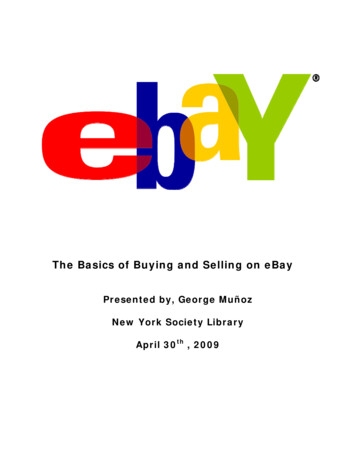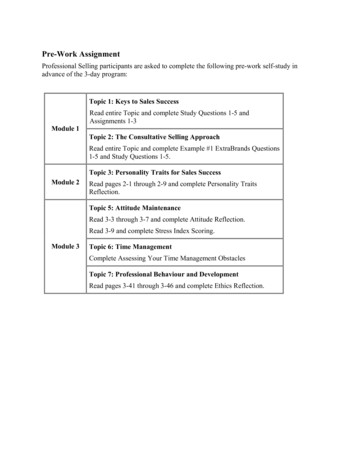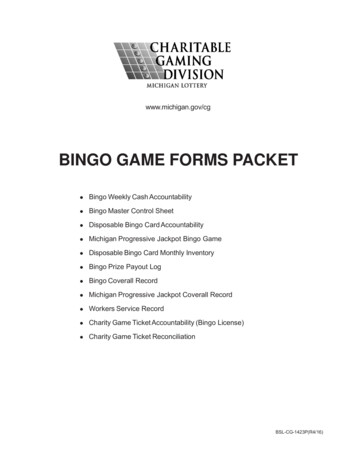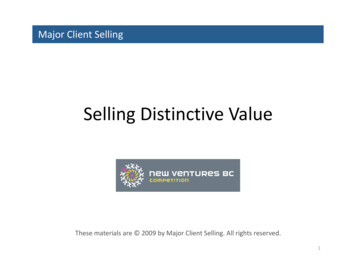
Transcription
ASold onSelling Policies“That’s our policy!” Have you ever heardthis phrase? Likely, you have, but whatdoes it really mean? Organizations putcertain policies (expected plans or coursesof action) in place to avoid the chaos thatwould ensue if every situation had to beconsidered and handled individually.Let’s say your local pool closes at9:00 pm, and no one is admitted entranceafter 8:15 pm. This is an organizationalpolicy—when employees follow it, theydon’t have to wonder what to tell customers who show up at 8:30. Policies are alsoin place at your school (e.g., the gradingscale and the dress code) and at otherbusinesses and organizations. Can youthink of some examples?Most businesses have policies inplace that cover all aspects of the sellingprocess. These selling policies eliminateguesswork and make things run smootherfor the businesses, their salespeople,and their customers. Learn more aboutselling policies—what they are, howthey’re shaped, and why they are soimportant!Regardless of whether a business puts its selling policiesin writing or simply talks to its employees about them,the individual salespeople are ultimately responsible forimplementing the policies.Selling policies are the general rules that a business’s managers setto guide the personal-selling effort. They establish uniform operatingprocedures for all salespeople to follow and are very useful in routineselling situations. They outline how the selling process should go andensure that all customers are treated fairly and consistently.A business may put its selling policies in writing, or it may simplytalk to employees about them. This generally depends on the natureof the organization. Companies with large sales forces usually provide policy handbooks that fully explain all selling policies to salestrainees. On the other hand, small companies with few salespeople mayoperate without written policies.Opinions vary as to whether selling policies should be put in writingor passed on verbally. Those in favor of written policies feel that employees receive better direction, are more consistent when making decisions,and function more efficiently and effectively under their guidance.Those against written policies claim that they are too restrictive, inflexible, and unworkable due to the frequent changes made to them. Whethersales policies are written or simply understood, the primary responsibilityfor implementing them rests with the individual salesperson.Common types of selling policiesObjectivesABExplain the importance of selling policies.Explain factors that affect selling policies.2LAP-SE-121-CS 2013, MBA Research and Curriculum Center Selling policies apply to a wide range of business activities, from theprovision of credit to the delivery of the product. Consequently, a company may have a large number of selling policies in place. By categorizingthem, you can gain a better understanding of their nature and function.Selling policies can be categorized into three basic groups that: Govern the salesperson’s Dictate the services aselling activitiessalesperson can offer Relate to the terms of the saleSell Right
ASelling-activity policies. Selling-activity policies focus on providing salespeople with guidelines for interacting with customersor potential customers. They are basic directions that explain how salespeople should approach and deal with customers and howto best use their time. Selling-activity policies cover areas such as: Prospecting—The amount of time a salesperson spendsin search of new clients depends on the type of products/he sells. A salesperson selling luxury yachts, for example,would spend more time looking for customers than would asalesperson selling cars. Companies should create policiesthat give salespeople an estimate of the amount of time tospend prospecting. Opening the relationship—Managers may give salespeople a policy to guide their approach to new customers. Inmany retail settings, for instance, salespeople are taught toposition themselves near entrances so they can greet customers as they enter the store. Qualifying the customer—The company should givesalespeople a policy for determining whether or not a prospectqualifies as a customer. This may depend on the prospect’scredit rating or the size of the intended purchase. Presenting the sales message—Policies differ fromcompany to company as to the appropriate techniques touse in a sales presentation. For example, telemarketers maybe trained to use a forceful presentation, while someoneselling computer software in a retail store uses a “soft-sell”approach. Meeting quotas—A sales quota is a minimum level ofsales required from each salesperson within a certain timeperiod. It may refer to a number of products (e.g., openingfour new checking accounts for banking customers perweek), or it may refer to a dollar amount (e.g., generating 100 in sales volume per shift). Not all companies use salesquotas, but the ones that do should outline them clearly intheir selling policies. Selling floor models or “open-box” items—Occasionally, salespeople run into special situations in whichthey can give discounts on display models of products (achild’s bike, for instance) or “open-box” items that havebeen returned (a flat-screen television, perhaps). Sellingpolicies should cover these situations so that salespeopleknow exactly what “deals” they can offer customers. Servicing the account—The extent to which salespeopleshould devote their time and energies to follow-up may beclearly defined in an employee’s handbook.Terms-of-sale policies. Terms-of-sale policies focus onthe aspects of a sale with which customers are most concerned.Let’s say your employer made you responsible for buying a newrefrigerator for the break room. You would probably ask first aboutthe product’s price, its availability, and any discounts the seller mayoffer. You might also be concerned with the seller’s credit offers.These terms are often covered by the following terms-of-sale policies:Goodshoot/ThinkstockNot sure how to interact with prospects or customers?Check out your company’s selling-activity policies. Entertaining the customer—A business may need to setpolicies explaining the use of expense accounts to limit thecosts of business lunches, dinners, sport or concert tickets,etc. Customer-interaction policies may also cover what typesof gifts salespeople can or cannot receive from clients.Sell Right Pricing policies—A multitude of factors, such as a business’s sales volume, image, expenses, and competition,determine its pricing policies. It’s a good idea for a salesperson to have a general understanding of the business’spricing policies so s/he can explain a product’s value tocustomers. Discount policies—A business may offer financial discounts for things such as early payment or buying in bulk.Knowing what discounts are available can help salespeoplemake more attractive offers to potential customers.LAP-SE-121-CS 2013, MBA Research and Curriculum Center 3
A Credit policies—Salespeople are often responsible for obtaining credit approval, explaining credit denial, and acting asa link between the credit office and the customer. Therefore, it’s important for them to thoroughly understand the business’scredit policies. Liability policies—Selling some products may require salespeople to obtain a liability waiver from the customer. Thinkbungee jumping or parasailing. The liability waiver releases the company from responsibility for something that might gowrong—because the customer is acknowledging the inherent risks involved in purchasing the product or taking part in theactivity. Can you think of other products that might require a liability waiver?Service policies. Service policies are designed to govern the support a company provides to customers after the sale. Whileterms-of-sale policies are at the heart of a sale, service policies can add to overall customer satisfaction. This may be especially truewhen the product is complex, requires regular maintenance, or is new and attracts uncertain buyers who may later wish to return it.Service policies usually include: Return and adjustment policies—Policies governing the return of goods range from strict to liberal. Liberal policiesallow customers to return merchandise or receive an adjustment with few or no restrictions. Strict policies may impose timelimits for returns or make adjustments for credit only instead of cash. Delivery policies—Delivery policies vary across companies and industries. Retailers may not offer delivery, they maycharge a fee for it, or they may provide it free of charge. Manufacturers usually provide delivery, but responsibility for thetransportation charges may be a point to discuss. Installation policies—The salesperson may be responsiblefor overseeing product installation. Installation may be neededfor products such as carpet in an office building, a computersystem for a school, or a washing machine in a home. Guarantee policies—Guarantees of quality or product performance often cover a certain period of time or specific partsof the product. Some automobile manufacturers, for example,offer warranties covering major parts of a car’s engine forthree years. Salespeople must know these policies inside andout so that they can explain the details to customers.Characteristics of selling policiesiStockphoto/Thinkstock Repair and maintenance policies—Salespeopleshould be aware of any maintenance or repair agreements that offer continued care of a product. Theyshould know if a fee is involved and how long theagreement lasts.If your business offers delivery, installation, and/or repair and main-Selling policies should apply equally to every salestenance services, make sure that you explain any related costs andperson in the company. To ensure that this is the case,restrictions to your customers.managers must fully explain all selling policies to each new hire. Many companies offersales-training programs that can provide the time needed to review the policies in detail.Selling policies need to have a bit of flexibility so that an occasional exception can be made. For example, a retailer may require customers to have salesreceipts when exchanging merchandise. But, if a regular customer who haslost his/her receipt wishes to return an item purchased from you a few daysbefore, you could probably make an exception to the policy as a way to extendcustomer goodwill and retain business.4LAP-SE-121-CS 2013, MBA Research and Curriculum Center Sell Right
ASelling policies must, however, be interpreted and enforced in a reasonably firm manner. If not, they cannot be consideredpolicies at all. Imagine if a business treated each customer differently. There would be no standard operating proceduresto streamline company activities, and some customers would receive more favorable treatment than others. This couldresult in a loss of reputation and profitability.Need for selling policiesA business adopts selling policies to help meet its goals andincrease profitability. Selling policies help to accomplish this byproviding a framework in which to make appropriate decisionsand establish good relationships with customers. These policiesdefine the sales job for that particular business and ensureuniform action by salespeople. For example, going door to doorselling cable and Internet services is a difficult job that requiresaggressive sales techniques, while soft-drink sales often are automatic, requiring less aggressive tactics by the salesperson.Selling policies benefit the salesperson, the company,and its customers. They can: Prevent misunderstandings Reduce confusion for employees Keep salespeople from having to make decisionson their own Make sure appropriate action is taken when necessary Assure that customers receive fair and equal treatmentiStockphoto/Thinkstock1. What are selling policies?2. Are selling policies written or verbal?3. Who is responsible for implementingselling policies?4. What are selling-activity policies?5. What are terms-of-sale policies?6. What are service policies?7. What are some characteristics of effectiveselling policies?8. Why are selling policies necessary?Well-defined selling policies may also enhance employee loyalty, increase job satisfaction, and contribute to a morepleasant work experience. Furthermore, managers can use selling policies to assess sales staff performance and determineappropriate actions for giving raises and promotions.SummarySelling policies are general rules, normally established by management, to guide the selling effort. These policies outlineuniform operating procedures for salespeople to follow in routine selling situations. Sales policies may be written or verbal.Salespeople are responsible for their implementation. There are three categories of selling policies—selling-activity policies,terms-of-sale policies, and service policies. Selling policies need to be flexible yet interpreted and enforced in a firm manner.A company relies on selling policies to help it achieve its goals and increase its profitability.Government regulations restrict businesses from engaging in pricediscrimination. Simply put, a business cannot charge one customerone price for a product, then charge a different customer a differentprice. However, these laws don’t necessarily apply to giving discountsor special favors. For example, a salesperson may find an extra couponto give a favorite customer when s/he comes into the store, or a salesperson may throw in some “bonus” products or samples after a purchase has been made. These actions are not illegal, and they mayeven contribute to building stronger relationships with some customers.But, are they ethical? What do you think?Sell RightLAP-SE-121-CS 2013, MBA Research and Curriculum Center 5
BWay to Sell ItA number of different influences can affect a business’s selling policies.There are three basic types of these influencing factors, including externalfactors, internal factors, and regulatory factors.Let’s take a closer look at each.External factorsForces operating in the business environmentover which the business has little or no controlare known as external factors. Examples ofexternal factors include:InternalFactorsExternalFactorsCustomer wants and needs. To make purchases, customers may requirecredit, product delivery, or other services. To be successful, a company mustset its selling policies itors’ actions. The number of competitors, their services, and theprices they charge for similar goods or services can affect a company’s selling policies.Availability of raw materials. The ability to obtain materials to be used in making goods can affect selling policies. If, for example,there’s a shortage of oranges due to difficult weather conditions, wholesalers may tell their sales staffs not to offer discounts onorange juice to grocery stores or other retailers because these discounts stimulate sales and demand. The materials shortage hascreated the need for this policy.Social concerns. Sometimes, the public mayexpress concerns about a business’s goods and services. Pollution problems or health concerns mightinfluence a company to change products, makingthem more expensive.Internal factorsPollution or health concernsmay influence a company to changeproducts, which can lead to changesin its selling policies.Stockbyte/ThinkstockInternal factors, those forces present within thecompany itself, also affect selling policies. The natureof the business is an internal factor that limits theselling policies that can be created. For example, acompany that specializes in business-to-businesssales or sales of luxury items might have much moreliberal policies regarding client entertainment thana smaller business would. Other internal factorsinclude:Corporate goals and objectives. A company’sgoal may be to establish a reputation for quality serviceafter the sale. This would probably affect its return and maintenance policies.Human and financial resources. If a business has limited finances, its credit policy may reflect this by having rather strictrequirements for credit approval. If its sales force is limited, it may not be able to offer personal supervision of delivery or installation.6LAP-SE-121-CS 2013, MBA Research and Curriculum Center Sell Right
BProduction capacity. Excess production capacity might encourage a company to alter its pricing policy. Lowering its prices mightstimulate demand, and there will then be a need to utilize the excess capacity.Research and development efforts. Based on its research efforts, a firm might set a policy to guarantee changes based on customerrequests for special orders.Regulatory factorsFederal and state governments, along with the regulatory agencies they have created, pass legislation that affects businesses andtheir selling policies. Regulatory factors include consumer-protection regulations and federal antitrust laws intended to ensure faircompetition among businesses. Antitrust regulations include:The Sherman Act. This act prohibits competingcompanies from conspiring to control their prices. Sellingpolicies need to clarify that prices are set by the companyalone, not in conjunction with competitors.The Robinson-Patman Act. This legislation forbidscompanies from discrimination in the prices or services itoffers to competing customers. It was passed to protectsmall customers from being at a disadvantage. Businessescan offer lower prices to big customers only if the discountsare based on cost savings.The Clayton Act. This act keeps a company from making the purchase of one of its goods or services dependenton purchases of others. For example, a computer manufacturer cannot force a customer to buy a service contract as aprecondition to buying the computer itself.The Federal Trade Commission Act. This act declares any competition deemed unfair by the Federal TradeCommission to be illegal. Unfair methods of competitionmight include making deceptive product claims or interfering with the efforts of a competitor’s sales staff.Consumer regulations intended to protect individualswhen making purchases include:The Fair Packaging and Labeling Act. This actmakes it illegal to use unfair or deceptive packaging orlabeling for certain consumer products.The Truth-in-Lending Act and the Credit CardAct of 2009. These acts require companies to be fairand transparent with their credit practices.iStockphoto/ThinkstockAs you can see, external factors, internal factors, andgovernment regulations can all greatly affect selling policies. Furthermore, shifts in external or internal forces,as well as changes in regulations, can create the needto add, remove, or change certain selling policies.John Foxx/Stockbyte/ThinkstockSell RightLAP-SE-121-CS 2013, MBA Research and Curriculum Center 7
BWhat’s the problem?Salespeople may encounter difficulties when they are not knowledgeable of their company’s selling policies, are unable toexplain the policies to a customer, or are asked to make an exception to a policy. For example, a salesperson who cannotexplain his/her company’s delivery and installation policies is risking the sale.In an extreme case, poorly administered policies can forcea company out of business. A company may offer prospectivecustomers extremely liberal credit terms without checking theircreditworthiness. If these customers do not pay, the companymay have financial difficulties.To avoid some of these negative effects, managers shouldensure that their selling policies do not: Restrict the salesperson’s normal authority Slow down the sales process Restrict the salesperson with petty rules Frustrate the salesperson and the customer Give the customer the impression that the salespersoncan act independently without considering what mightbe best for both the buyer and the sellerComstock/ThinkstockTo be effective, selling policies should neither frustratesalespeople nor restrict their normal authority.SummarySelling policies are influenced by many factors. These factors can be external, internal, or regulatory. External factors are thosein the business environment over which the company has little or no control. Internal factors are those stemming from the limitsof the organization and the goals the company seeks to achieve. Regulatory factors include federal and state antitrust and consumer regulations. Managers can take steps to reduce any negative effects of the selling policies they have established.iStockphoto/Thinkstock1. What external factors affect selling policies?2. What internal factors affect selling policies?3. What regulatory factors affect selling policies?4. What are some potential problems involvedwith selling policies?5. How can managers minimize the potentialproblems involved with selling policies?What selling policies are in place whereyou work? How do they affect salespeopleand customers? Is there anything youwould change about any of them?If so, why?If you are not working right now, think of arecent time when a selling policy affectedyou as a customer. Was it a positive experience or a negative one?1375 King Avenue, P.O. Box 12279, Columbus, Ohio 43212-0279 Ph: (614) 486-6708 Fax: (614) 486-1819Details: www.MBAResearch.org Copyright 2013, by MBA Research and Curriculum Center 8LAP-SE-121-CS 2013, MBA Research and Curriculum Center Sell Right
Selling policies are the general rules that a business's managers set to guide the personal-selling effort. They establish uniform operating procedures for all salespeople to follow and are very useful in routine selling situations. They outline how the selling process should go and ensure that all customers are treated fairly and consistently.










